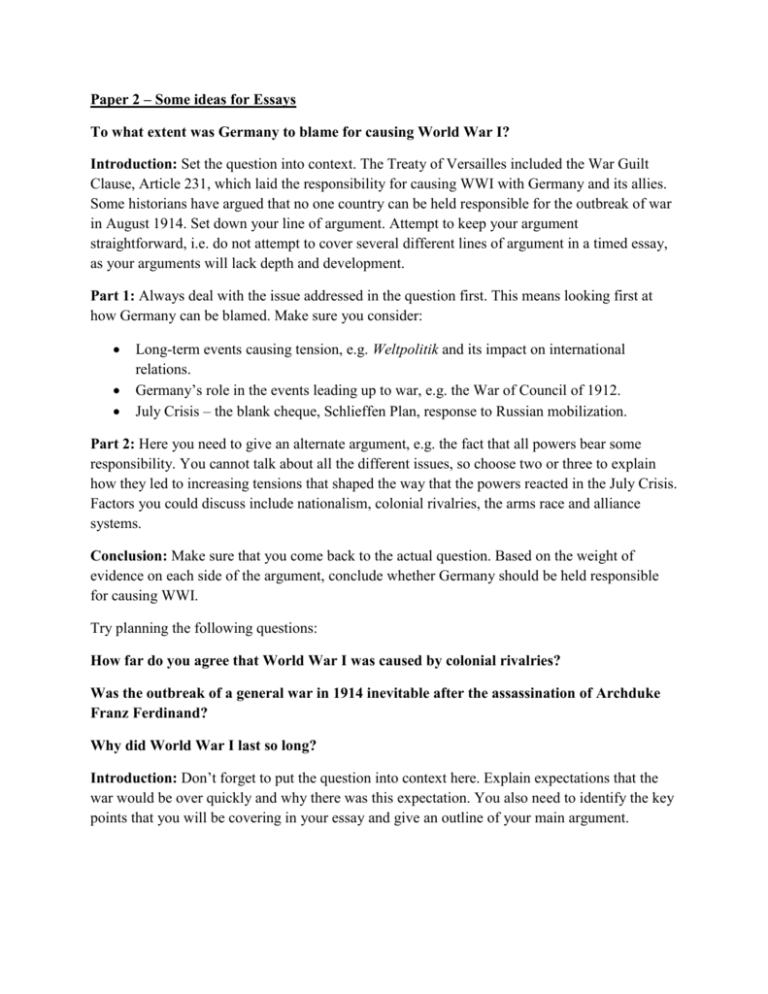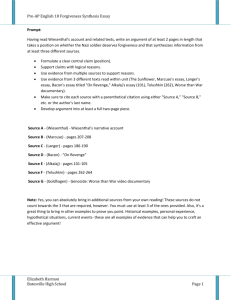Paper 2 Essay Plans
advertisement

Paper 2 – Some ideas for Essays To what extent was Germany to blame for causing World War I? Introduction: Set the question into context. The Treaty of Versailles included the War Guilt Clause, Article 231, which laid the responsibility for causing WWI with Germany and its allies. Some historians have argued that no one country can be held responsible for the outbreak of war in August 1914. Set down your line of argument. Attempt to keep your argument straightforward, i.e. do not attempt to cover several different lines of argument in a timed essay, as your arguments will lack depth and development. Part 1: Always deal with the issue addressed in the question first. This means looking first at how Germany can be blamed. Make sure you consider: Long-term events causing tension, e.g. Weltpolitik and its impact on international relations. Germany’s role in the events leading up to war, e.g. the War of Council of 1912. July Crisis – the blank cheque, Schlieffen Plan, response to Russian mobilization. Part 2: Here you need to give an alternate argument, e.g. the fact that all powers bear some responsibility. You cannot talk about all the different issues, so choose two or three to explain how they led to increasing tensions that shaped the way that the powers reacted in the July Crisis. Factors you could discuss include nationalism, colonial rivalries, the arms race and alliance systems. Conclusion: Make sure that you come back to the actual question. Based on the weight of evidence on each side of the argument, conclude whether Germany should be held responsible for causing WWI. Try planning the following questions: How far do you agree that World War I was caused by colonial rivalries? Was the outbreak of a general war in 1914 inevitable after the assassination of Archduke Franz Ferdinand? Why did World War I last so long? Introduction: Don’t forget to put the question into context here. Explain expectations that the war would be over quickly and why there was this expectation. You also need to identify the key points that you will be covering in your essay and give an outline of your main argument. Main body of the essay: Below is a list of points that you could consider in this essay. How did each of these factors contribute to the length of the war. You may want to make some of these points whole paragraphs or combine two or more into one paragraph. The two sides were of similar strength The trench systems on the Western front The tactics of the commanders Technological developments Failure of the Schlieffen Plan Failure to gain command of the seas Failure at attempts to negotiate peace Failure of diversionary fronts Conclusion: State your overall argument based on what you have discussed in the main body of your essay. Try this essay: Why did the Central Powers lose World War I? You could discuss the failures of Germany and then the strengths/successes of the allies. Alternatively you could divide the factors into the following sections: War on land. War at sea. Total war and how Germany organized its resources compared to the Allies. Economic factors and the collapse of Germany. (Do you consider economic or military factors to be the most important reasons for the Central Powers losing the war?) Question: Why did collective security fail to keep the peace between 1920 and 1935? Introduction: Identify and explain key terms/concepts in the actual question. You need to explain the concept of collective security and that the League of Nations had been established to facilitate this policy. You also need to show the examiner that you understand the relevance of the dates in question. How did the situation regarding collective security change between these two dates? What was the relevance of 1935? Do not forget to set out your argument to show the direction that the essay will take. Section 1: The main instrument for collective security was the League of Nations. In explaining why collective security failed, you need to outline the weaknesses of the L of N that were to undermine its ability to perform its task of keeping the peace. Section 2: Collective security was undermined not just by the machinery of the League, but also by the continued willingness of countries to work outside the League to achieve peace. France in the Ruhr, the various agreements made in the 1920’s etc. Section 3: The impact of the Great Depression needs to be examined here, as this had a big impact on the desire/ability of nations to work collectively together for peace. Section 4: Here analyze the specific events of the 1930’s – Manchuria, Abyssinia and Disarmament Conference etc. – that showe the inability of the League to work together. Conclusion: Based on the evidence in the main body of the essay, refer back to the question directly and make sure you state your answer clearly and it correlates to your evidence. Essay Question: To what extent was the League of Nations doomed to fail? Introduction: You must always start by defining key words/terms in the question. Here you need to define ‘doomed to fail’, i.e. that the inherent problems with the League’s structure, mandate and membership made it likely to fail. As this is a ‘to what extent’ question, you will need to present a counter-argument. State this clearly in your introduction, for example, that the League was not inherently flawed but failed due to the impact of the Great Depression and the actions of the powers themselves. Section 1: Always start with the argument presented in the question itself, i.e. that it was ‘doomed to fail’, and give arguments to support this view, such as: Weaknesses in structure, mandate and membership Failures to keep the peace in the 1920’s Section 2: Now address an alternative view – that the League was not doomed to fail. Look at: Strengths in structure, mandate and membership Evidence of success in peacekeeping in the 1920’s The international impact of the Great Depression Conclusion: Based on the weight of evidence in the main body of the essay, refer back to the question directly and state whether the League was doomed to fail or not.








